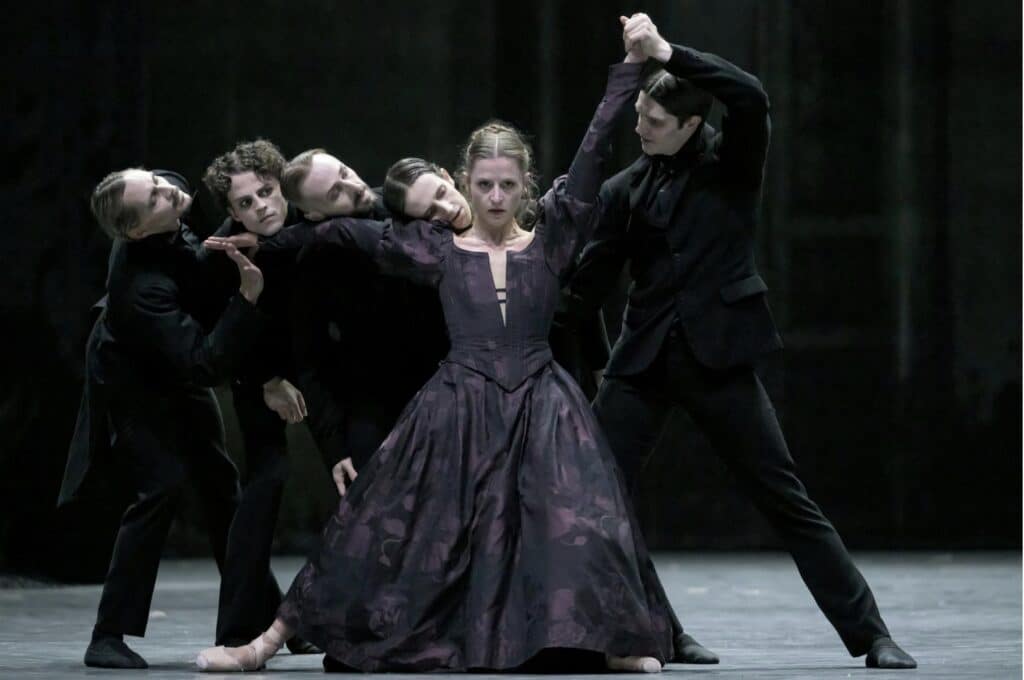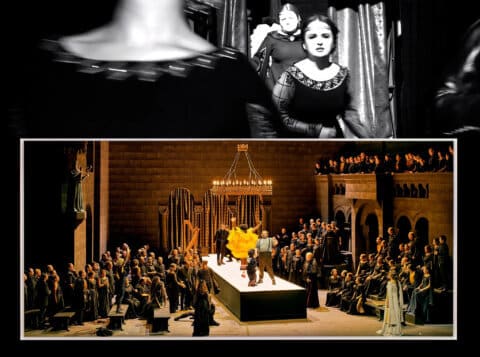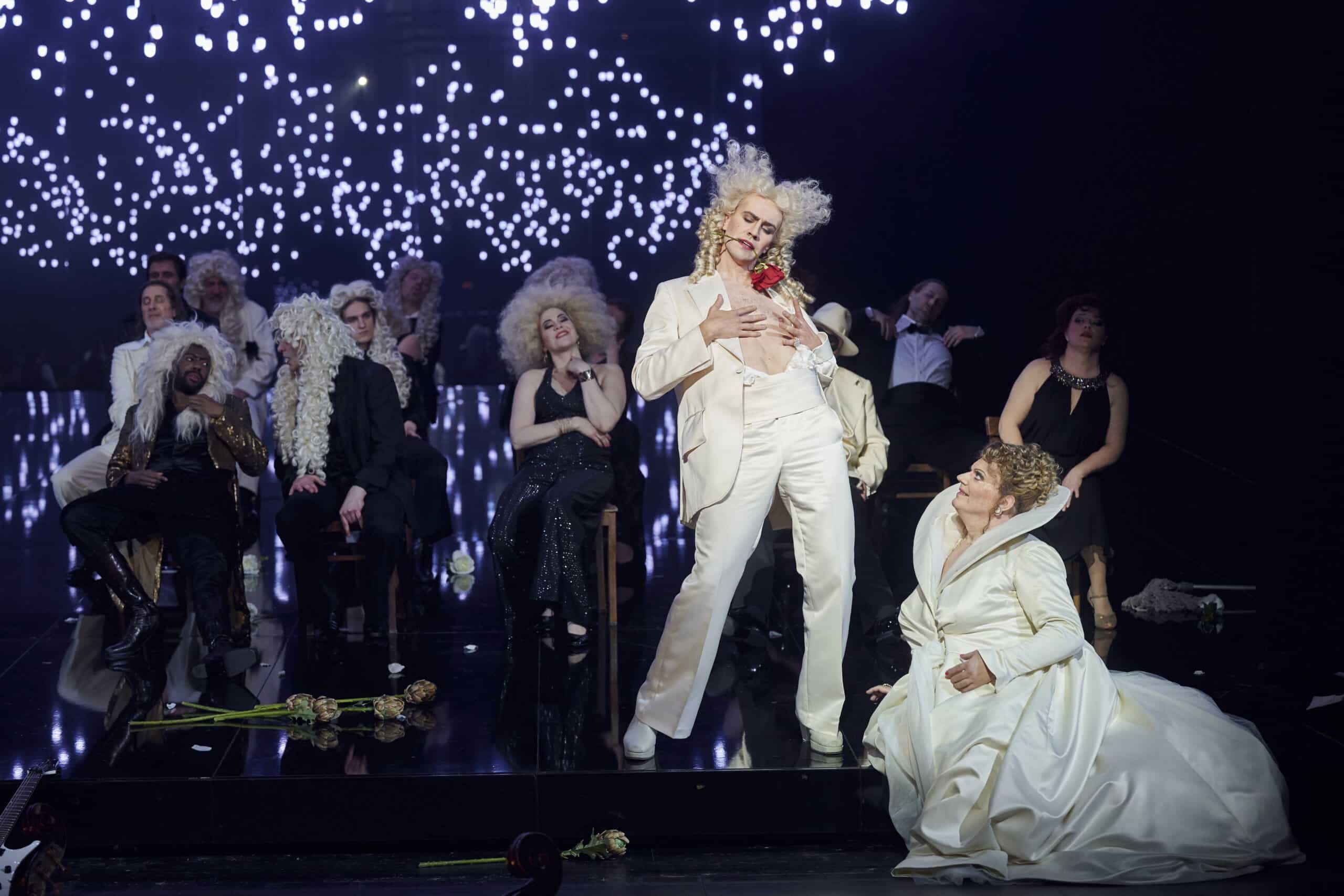BOVARY • STAATSBALLETT BERLIN
★★★★☆☆

Photo: Serghei Gherciu
REVIEW BOVARY: HOT FANTASIES AND FATAL ATTRACTION MISSES CLIMAX IN BERLIN
The scandalous novel about Madame Bovary is obvious stage drama material. Despite being more than 200 years old, the story checks directly into the social media issues of 2024.
Staatsballet Berlin has transformed the novel into a watchable, dynamic full-length ballet that is loyal to its source material, but could perhaps have raised the stakes with a more radical interpretation and a stronger stage design.
More and more people, especially young people, are being hammered by social media-related inferiority at the sight that everyone seems to have a much richer life than you.
Similarly, Madame Bovary is a victim of her unfulfilled longings for rapturous, passionate love, flaming romances and throbbing eroticism.
The novel Madame Bovary is the work of Gustave Flaubert, who tells the story of Emma Bovary, a woman dissatisfied with provincial life and her passionless marriage.
The novel caused a scandal when it was published in 1857 due to its honest portrayal of the complicated nature of desire and explicit infidelity, which shouldn’t be allowed to spread (too far) and challenge social structures.
A much-publicized court case ended with Flaubert being acquitted of obscenity charges, but the incident was of course a great PR win for the amoral story of Emma, who marries a nice but somewhat boring village doctor who can’t live up to his wife’s unrealistic expectations of stormy heights and dangerous desire.
Hot fantasies she has acquired through vigorous reading of all the daydreaming literature she can get her hands on.
The longing is soothed with secret lovers, the young clerk Leon and the well-padded slambert Rodolphe, expensive clothes, ostentatious manners and exclusive home furnishings.
It all happens right under the nose of the naively unsuspecting husband, leading to ruin, despairing humiliation and a theatrical suicide by arsenic that places Madame Bovary in the club of fallen women that also includes La Traviata and Menon Lescult.
Renowned choreographer Christian Spuck has staged the drama as a ballet at the Deutsche Oper, where the expectation of the extraordinary lurks but is never quite realized.
Christian Spuck is known as the director of the Zurich Ballet, who completely blew me away with Nachtträume last year in Marcos Morau’s brilliant production. Read the six-star review here.
Today, Christian Spuck has moved to the hot seat in the director’s chair of Staatsballett Berlin, where he makes his debut with BOVARY, which has received decent, but also somewhat lukewarm reviews in the German ballet press.
True, the ballet is a beautiful reproduction of the novel that adds nothing new or surprising.
The set design is on the edge of the ordinary, except for some large, grainy black and white video projections of 19th century farm work in suburban France, against which the ensemble and solo dancers in rather conventional costumes are matched.
A nice visual gimmick that punctures the notion of French village romance, showing a deadly, muddy agricultural drudgery that stands in stark contrast to Emma’s dreams of picturesque peasant idyll.
Beautiful images are created in the key scenes – at the party at the manor house, at the animal show, and in the sequences with the devil’s henchman in the form of the unscrupulous merchant Monsieur Lheureux, who supplies Madame with more and more luxury goods she can’t afford.
It would have been nice to see a more modernist, techno ambience with rivers of the kind of Facebook feed where we pester each other with endless selfies in a photoshopped mix of successful pastries, wonderful, undiscovered destinations, real friends and stress-free terrace fun in an atmosphere of rosé and loose linen.
The dancers are, of course, top-notch and deliver the choreography to music by Camille Saint-Saëns, Ligeti and others, with fine lyrical passages and moments of cinematic drama.
The quality of the overall picture is indisputable, but one misses an extra gear and the ambition of a bolder extemporization.
Perhaps this will come in the premiere of the aforementioned Marcus Morau’s Overture, performed in a promising double bill with Angels Atlas by Crystal Pite, premiering in late April/early May, which could be worth a trip.
BOVARY earns four stars from GOT TO SEE THIS




